Science Teaching: Perspectives on Students and Knowledge Construction
VerifiedAdded on 2023/05/31
|8
|1776
|444
Essay
AI Summary
This essay delves into the multifaceted world of science teaching, exploring various perspectives on the subject. It begins by defining science and its core components, emphasizing the skills and attitudes crucial for scientific inquiry. The essay then shifts its focus to the student, highlighting the teacher's role in shaping their minds and fostering essential behaviors like curiosity and honesty. It examines how knowledge is constructed through active social classrooms and the importance of addressing misconceptions. The essay further explores the components of good teaching, drawing on cognitive development theories and emphasizing the need for student-teacher interaction and active learning. Finally, it discusses the path to becoming a better teacher, focusing on organizing the classroom, inspiring students, and promoting self-development. The essay concludes by reiterating the significance of science teachers in shaping students' futures and fostering a genuine interest in science.
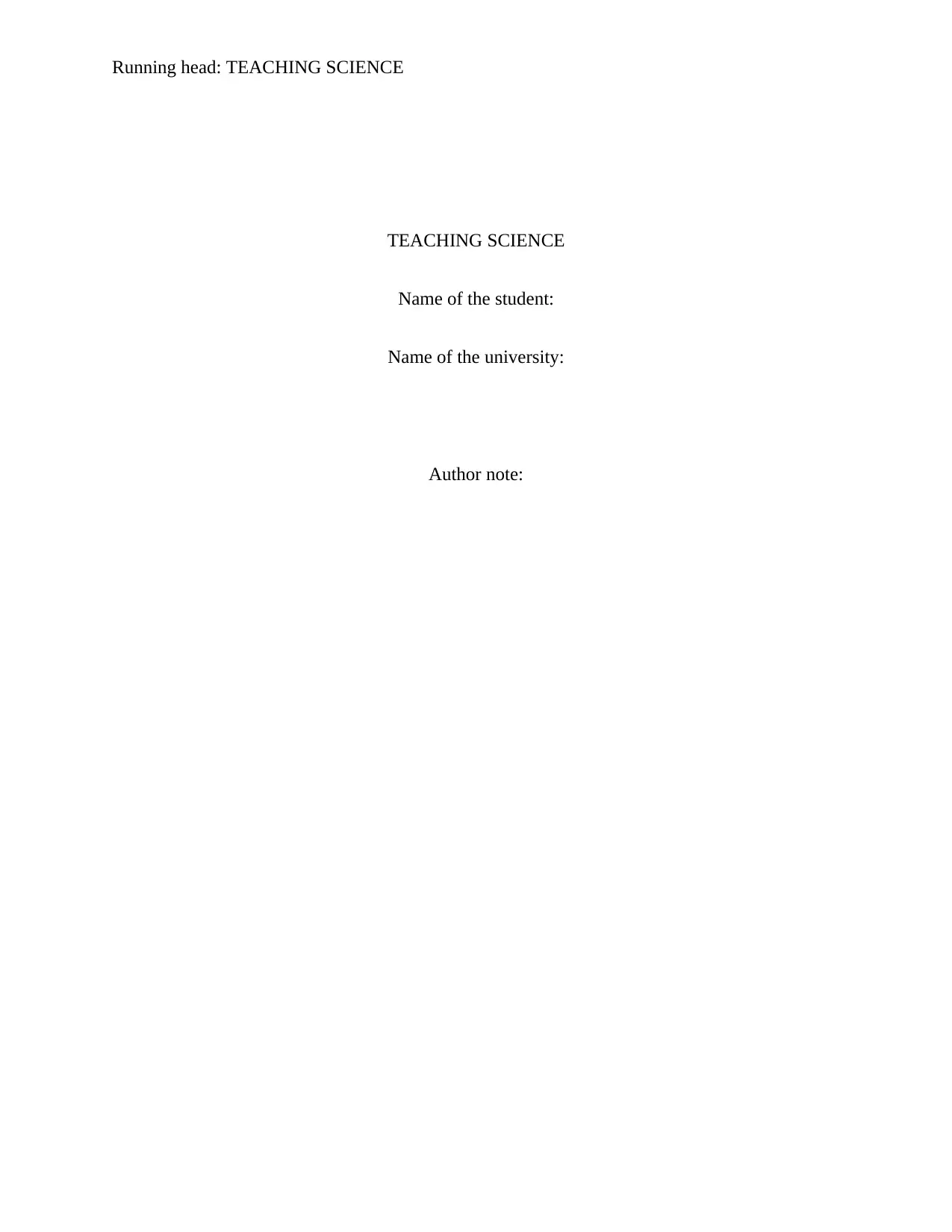
Running head: TEACHING SCIENCE
TEACHING SCIENCE
Name of the student:
Name of the university:
Author note:
TEACHING SCIENCE
Name of the student:
Name of the university:
Author note:
Paraphrase This Document
Need a fresh take? Get an instant paraphrase of this document with our AI Paraphraser
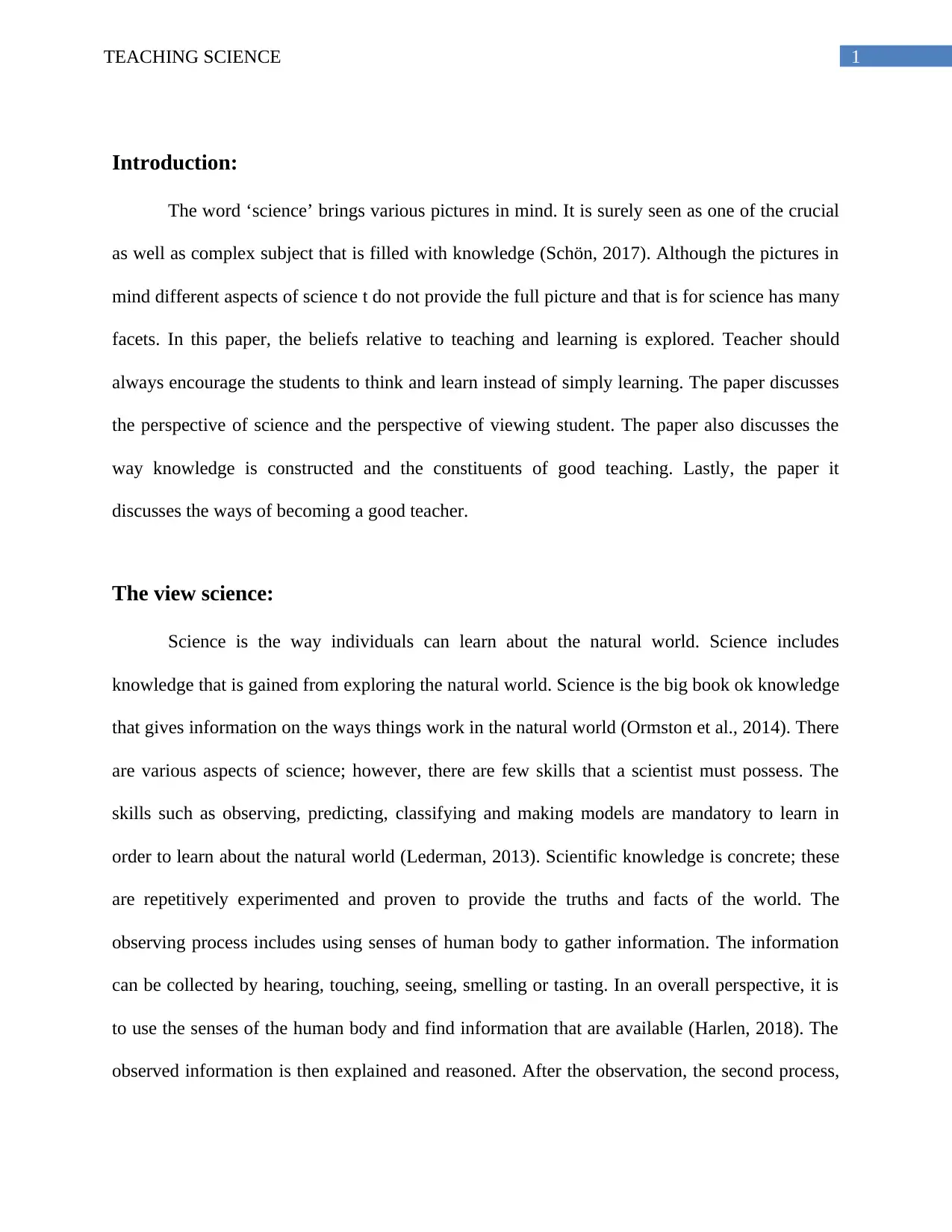
1TEACHING SCIENCE
Introduction:
The word ‘science’ brings various pictures in mind. It is surely seen as one of the crucial
as well as complex subject that is filled with knowledge (Schön, 2017). Although the pictures in
mind different aspects of science t do not provide the full picture and that is for science has many
facets. In this paper, the beliefs relative to teaching and learning is explored. Teacher should
always encourage the students to think and learn instead of simply learning. The paper discusses
the perspective of science and the perspective of viewing student. The paper also discusses the
way knowledge is constructed and the constituents of good teaching. Lastly, the paper it
discusses the ways of becoming a good teacher.
The view science:
Science is the way individuals can learn about the natural world. Science includes
knowledge that is gained from exploring the natural world. Science is the big book ok knowledge
that gives information on the ways things work in the natural world (Ormston et al., 2014). There
are various aspects of science; however, there are few skills that a scientist must possess. The
skills such as observing, predicting, classifying and making models are mandatory to learn in
order to learn about the natural world (Lederman, 2013). Scientific knowledge is concrete; these
are repetitively experimented and proven to provide the truths and facts of the world. The
observing process includes using senses of human body to gather information. The information
can be collected by hearing, touching, seeing, smelling or tasting. In an overall perspective, it is
to use the senses of the human body and find information that are available (Harlen, 2018). The
observed information is then explained and reasoned. After the observation, the second process,
Introduction:
The word ‘science’ brings various pictures in mind. It is surely seen as one of the crucial
as well as complex subject that is filled with knowledge (Schön, 2017). Although the pictures in
mind different aspects of science t do not provide the full picture and that is for science has many
facets. In this paper, the beliefs relative to teaching and learning is explored. Teacher should
always encourage the students to think and learn instead of simply learning. The paper discusses
the perspective of science and the perspective of viewing student. The paper also discusses the
way knowledge is constructed and the constituents of good teaching. Lastly, the paper it
discusses the ways of becoming a good teacher.
The view science:
Science is the way individuals can learn about the natural world. Science includes
knowledge that is gained from exploring the natural world. Science is the big book ok knowledge
that gives information on the ways things work in the natural world (Ormston et al., 2014). There
are various aspects of science; however, there are few skills that a scientist must possess. The
skills such as observing, predicting, classifying and making models are mandatory to learn in
order to learn about the natural world (Lederman, 2013). Scientific knowledge is concrete; these
are repetitively experimented and proven to provide the truths and facts of the world. The
observing process includes using senses of human body to gather information. The information
can be collected by hearing, touching, seeing, smelling or tasting. In an overall perspective, it is
to use the senses of the human body and find information that are available (Harlen, 2018). The
observed information is then explained and reasoned. After the observation, the second process,
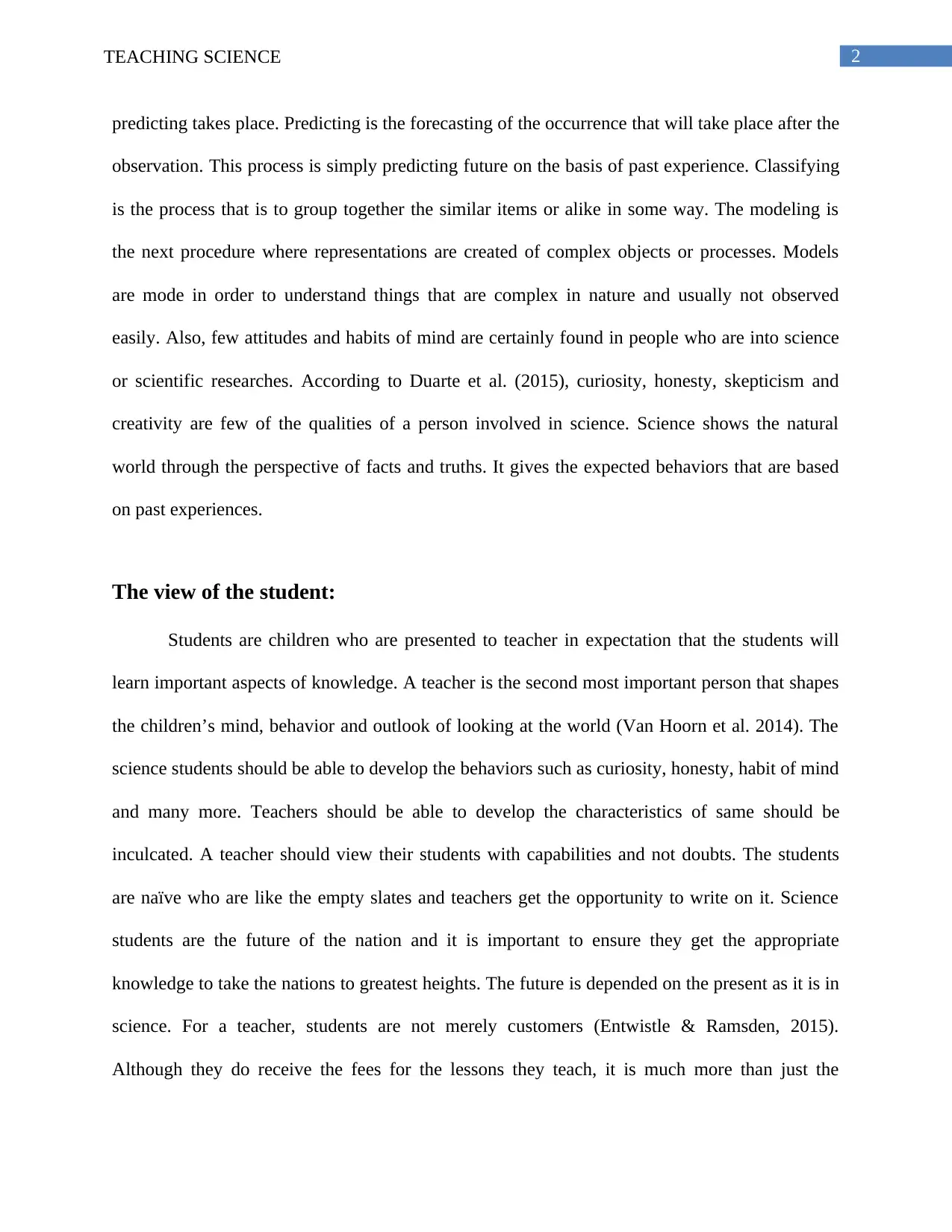
2TEACHING SCIENCE
predicting takes place. Predicting is the forecasting of the occurrence that will take place after the
observation. This process is simply predicting future on the basis of past experience. Classifying
is the process that is to group together the similar items or alike in some way. The modeling is
the next procedure where representations are created of complex objects or processes. Models
are mode in order to understand things that are complex in nature and usually not observed
easily. Also, few attitudes and habits of mind are certainly found in people who are into science
or scientific researches. According to Duarte et al. (2015), curiosity, honesty, skepticism and
creativity are few of the qualities of a person involved in science. Science shows the natural
world through the perspective of facts and truths. It gives the expected behaviors that are based
on past experiences.
The view of the student:
Students are children who are presented to teacher in expectation that the students will
learn important aspects of knowledge. A teacher is the second most important person that shapes
the children’s mind, behavior and outlook of looking at the world (Van Hoorn et al. 2014). The
science students should be able to develop the behaviors such as curiosity, honesty, habit of mind
and many more. Teachers should be able to develop the characteristics of same should be
inculcated. A teacher should view their students with capabilities and not doubts. The students
are naïve who are like the empty slates and teachers get the opportunity to write on it. Science
students are the future of the nation and it is important to ensure they get the appropriate
knowledge to take the nations to greatest heights. The future is depended on the present as it is in
science. For a teacher, students are not merely customers (Entwistle & Ramsden, 2015).
Although they do receive the fees for the lessons they teach, it is much more than just the
predicting takes place. Predicting is the forecasting of the occurrence that will take place after the
observation. This process is simply predicting future on the basis of past experience. Classifying
is the process that is to group together the similar items or alike in some way. The modeling is
the next procedure where representations are created of complex objects or processes. Models
are mode in order to understand things that are complex in nature and usually not observed
easily. Also, few attitudes and habits of mind are certainly found in people who are into science
or scientific researches. According to Duarte et al. (2015), curiosity, honesty, skepticism and
creativity are few of the qualities of a person involved in science. Science shows the natural
world through the perspective of facts and truths. It gives the expected behaviors that are based
on past experiences.
The view of the student:
Students are children who are presented to teacher in expectation that the students will
learn important aspects of knowledge. A teacher is the second most important person that shapes
the children’s mind, behavior and outlook of looking at the world (Van Hoorn et al. 2014). The
science students should be able to develop the behaviors such as curiosity, honesty, habit of mind
and many more. Teachers should be able to develop the characteristics of same should be
inculcated. A teacher should view their students with capabilities and not doubts. The students
are naïve who are like the empty slates and teachers get the opportunity to write on it. Science
students are the future of the nation and it is important to ensure they get the appropriate
knowledge to take the nations to greatest heights. The future is depended on the present as it is in
science. For a teacher, students are not merely customers (Entwistle & Ramsden, 2015).
Although they do receive the fees for the lessons they teach, it is much more than just the
⊘ This is a preview!⊘
Do you want full access?
Subscribe today to unlock all pages.

Trusted by 1+ million students worldwide
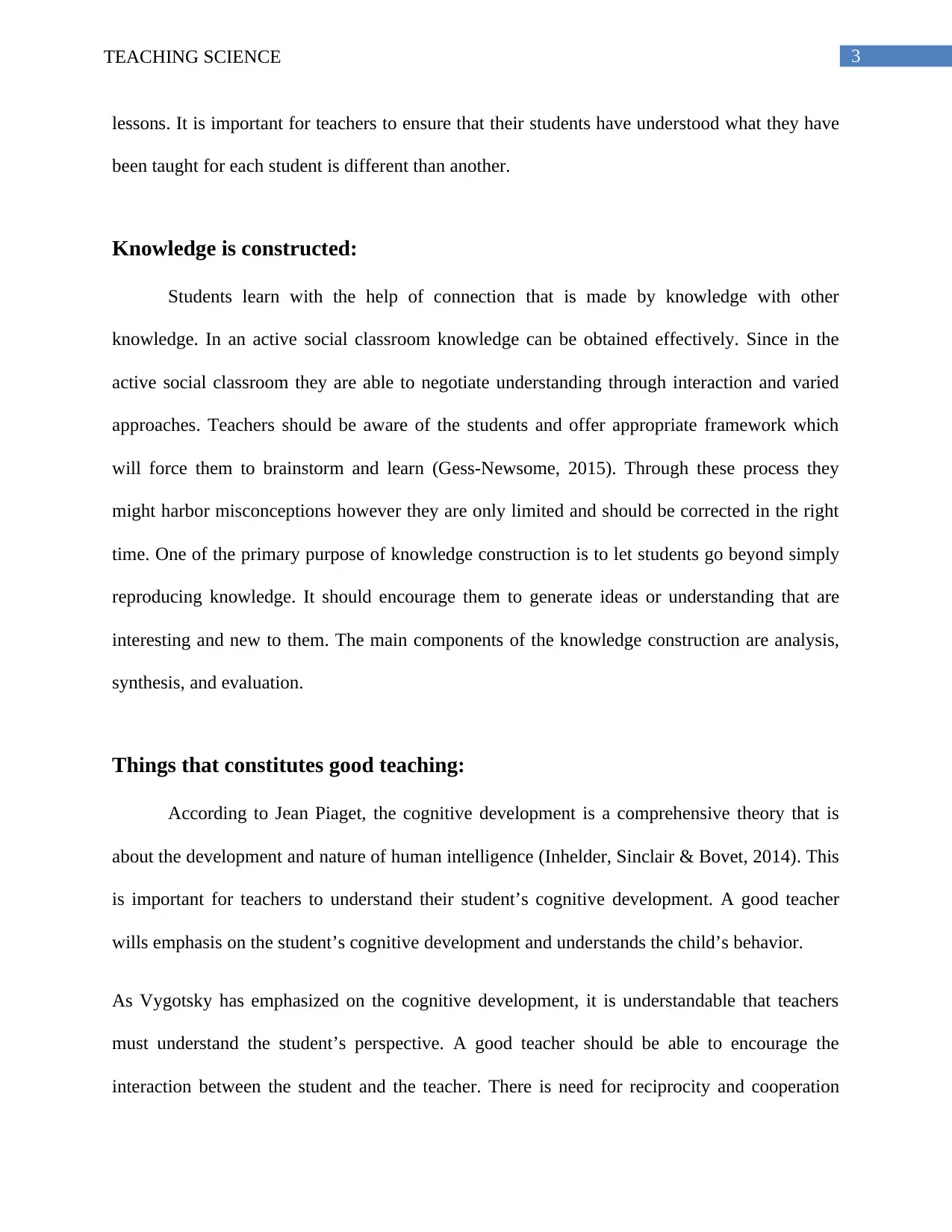
3TEACHING SCIENCE
lessons. It is important for teachers to ensure that their students have understood what they have
been taught for each student is different than another.
Knowledge is constructed:
Students learn with the help of connection that is made by knowledge with other
knowledge. In an active social classroom knowledge can be obtained effectively. Since in the
active social classroom they are able to negotiate understanding through interaction and varied
approaches. Teachers should be aware of the students and offer appropriate framework which
will force them to brainstorm and learn (Gess-Newsome, 2015). Through these process they
might harbor misconceptions however they are only limited and should be corrected in the right
time. One of the primary purpose of knowledge construction is to let students go beyond simply
reproducing knowledge. It should encourage them to generate ideas or understanding that are
interesting and new to them. The main components of the knowledge construction are analysis,
synthesis, and evaluation.
Things that constitutes good teaching:
According to Jean Piaget, the cognitive development is a comprehensive theory that is
about the development and nature of human intelligence (Inhelder, Sinclair & Bovet, 2014). This
is important for teachers to understand their student’s cognitive development. A good teacher
wills emphasis on the student’s cognitive development and understands the child’s behavior.
As Vygotsky has emphasized on the cognitive development, it is understandable that teachers
must understand the student’s perspective. A good teacher should be able to encourage the
interaction between the student and the teacher. There is need for reciprocity and cooperation
lessons. It is important for teachers to ensure that their students have understood what they have
been taught for each student is different than another.
Knowledge is constructed:
Students learn with the help of connection that is made by knowledge with other
knowledge. In an active social classroom knowledge can be obtained effectively. Since in the
active social classroom they are able to negotiate understanding through interaction and varied
approaches. Teachers should be aware of the students and offer appropriate framework which
will force them to brainstorm and learn (Gess-Newsome, 2015). Through these process they
might harbor misconceptions however they are only limited and should be corrected in the right
time. One of the primary purpose of knowledge construction is to let students go beyond simply
reproducing knowledge. It should encourage them to generate ideas or understanding that are
interesting and new to them. The main components of the knowledge construction are analysis,
synthesis, and evaluation.
Things that constitutes good teaching:
According to Jean Piaget, the cognitive development is a comprehensive theory that is
about the development and nature of human intelligence (Inhelder, Sinclair & Bovet, 2014). This
is important for teachers to understand their student’s cognitive development. A good teacher
wills emphasis on the student’s cognitive development and understands the child’s behavior.
As Vygotsky has emphasized on the cognitive development, it is understandable that teachers
must understand the student’s perspective. A good teacher should be able to encourage the
interaction between the student and the teacher. There is need for reciprocity and cooperation
Paraphrase This Document
Need a fresh take? Get an instant paraphrase of this document with our AI Paraphraser
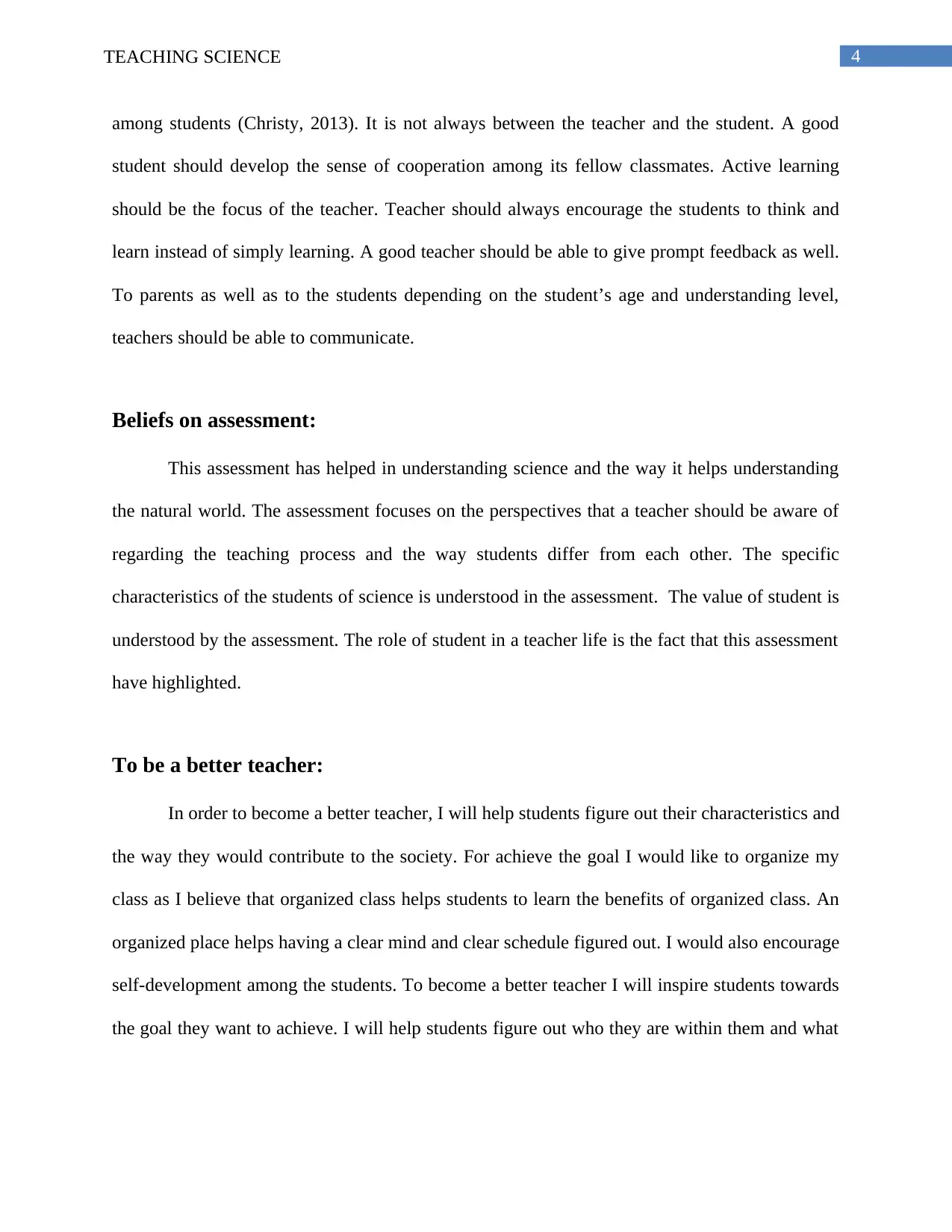
4TEACHING SCIENCE
among students (Christy, 2013). It is not always between the teacher and the student. A good
student should develop the sense of cooperation among its fellow classmates. Active learning
should be the focus of the teacher. Teacher should always encourage the students to think and
learn instead of simply learning. A good teacher should be able to give prompt feedback as well.
To parents as well as to the students depending on the student’s age and understanding level,
teachers should be able to communicate.
Beliefs on assessment:
This assessment has helped in understanding science and the way it helps understanding
the natural world. The assessment focuses on the perspectives that a teacher should be aware of
regarding the teaching process and the way students differ from each other. The specific
characteristics of the students of science is understood in the assessment. The value of student is
understood by the assessment. The role of student in a teacher life is the fact that this assessment
have highlighted.
To be a better teacher:
In order to become a better teacher, I will help students figure out their characteristics and
the way they would contribute to the society. For achieve the goal I would like to organize my
class as I believe that organized class helps students to learn the benefits of organized class. An
organized place helps having a clear mind and clear schedule figured out. I would also encourage
self-development among the students. To become a better teacher I will inspire students towards
the goal they want to achieve. I will help students figure out who they are within them and what
among students (Christy, 2013). It is not always between the teacher and the student. A good
student should develop the sense of cooperation among its fellow classmates. Active learning
should be the focus of the teacher. Teacher should always encourage the students to think and
learn instead of simply learning. A good teacher should be able to give prompt feedback as well.
To parents as well as to the students depending on the student’s age and understanding level,
teachers should be able to communicate.
Beliefs on assessment:
This assessment has helped in understanding science and the way it helps understanding
the natural world. The assessment focuses on the perspectives that a teacher should be aware of
regarding the teaching process and the way students differ from each other. The specific
characteristics of the students of science is understood in the assessment. The value of student is
understood by the assessment. The role of student in a teacher life is the fact that this assessment
have highlighted.
To be a better teacher:
In order to become a better teacher, I will help students figure out their characteristics and
the way they would contribute to the society. For achieve the goal I would like to organize my
class as I believe that organized class helps students to learn the benefits of organized class. An
organized place helps having a clear mind and clear schedule figured out. I would also encourage
self-development among the students. To become a better teacher I will inspire students towards
the goal they want to achieve. I will help students figure out who they are within them and what
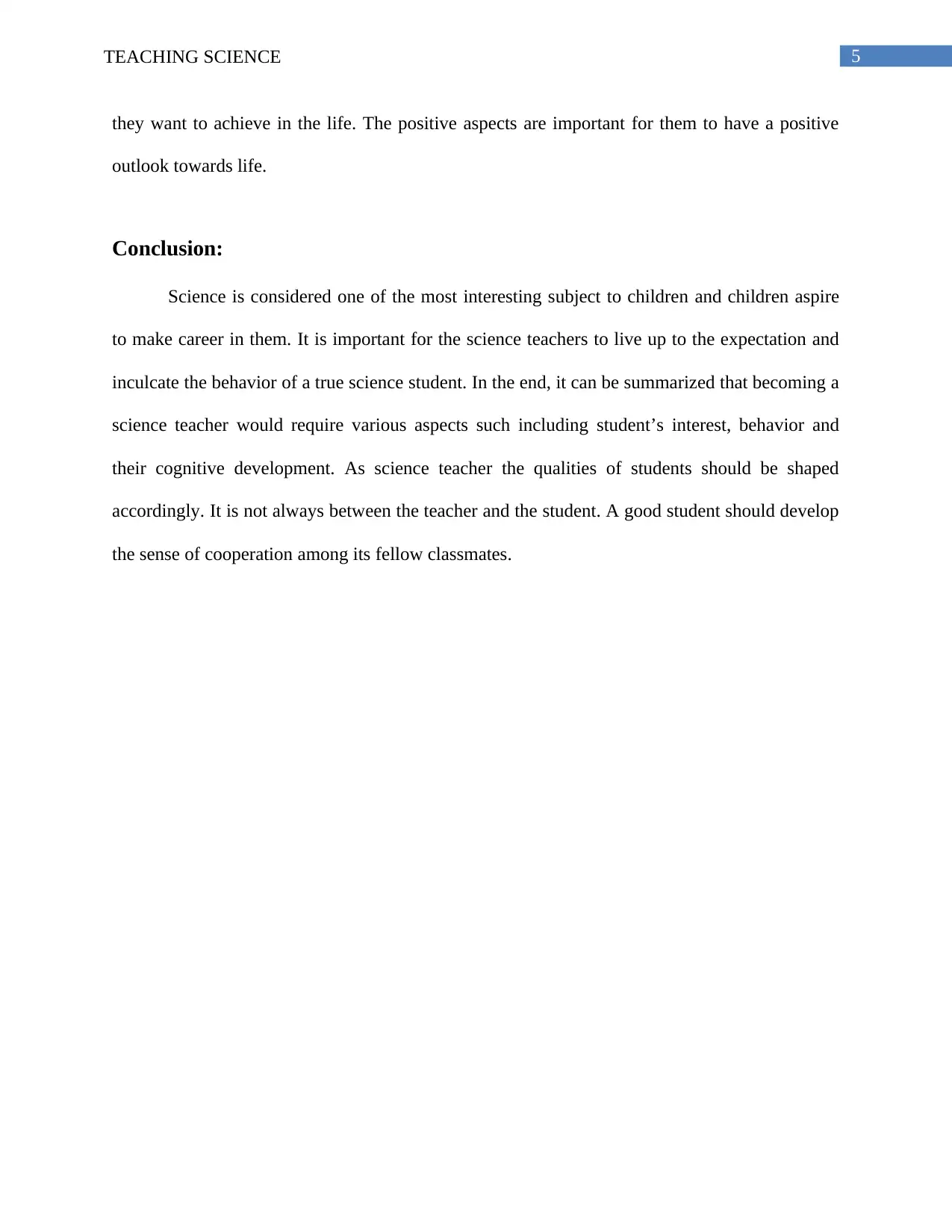
5TEACHING SCIENCE
they want to achieve in the life. The positive aspects are important for them to have a positive
outlook towards life.
Conclusion:
Science is considered one of the most interesting subject to children and children aspire
to make career in them. It is important for the science teachers to live up to the expectation and
inculcate the behavior of a true science student. In the end, it can be summarized that becoming a
science teacher would require various aspects such including student’s interest, behavior and
their cognitive development. As science teacher the qualities of students should be shaped
accordingly. It is not always between the teacher and the student. A good student should develop
the sense of cooperation among its fellow classmates.
they want to achieve in the life. The positive aspects are important for them to have a positive
outlook towards life.
Conclusion:
Science is considered one of the most interesting subject to children and children aspire
to make career in them. It is important for the science teachers to live up to the expectation and
inculcate the behavior of a true science student. In the end, it can be summarized that becoming a
science teacher would require various aspects such including student’s interest, behavior and
their cognitive development. As science teacher the qualities of students should be shaped
accordingly. It is not always between the teacher and the student. A good student should develop
the sense of cooperation among its fellow classmates.
⊘ This is a preview!⊘
Do you want full access?
Subscribe today to unlock all pages.

Trusted by 1+ million students worldwide
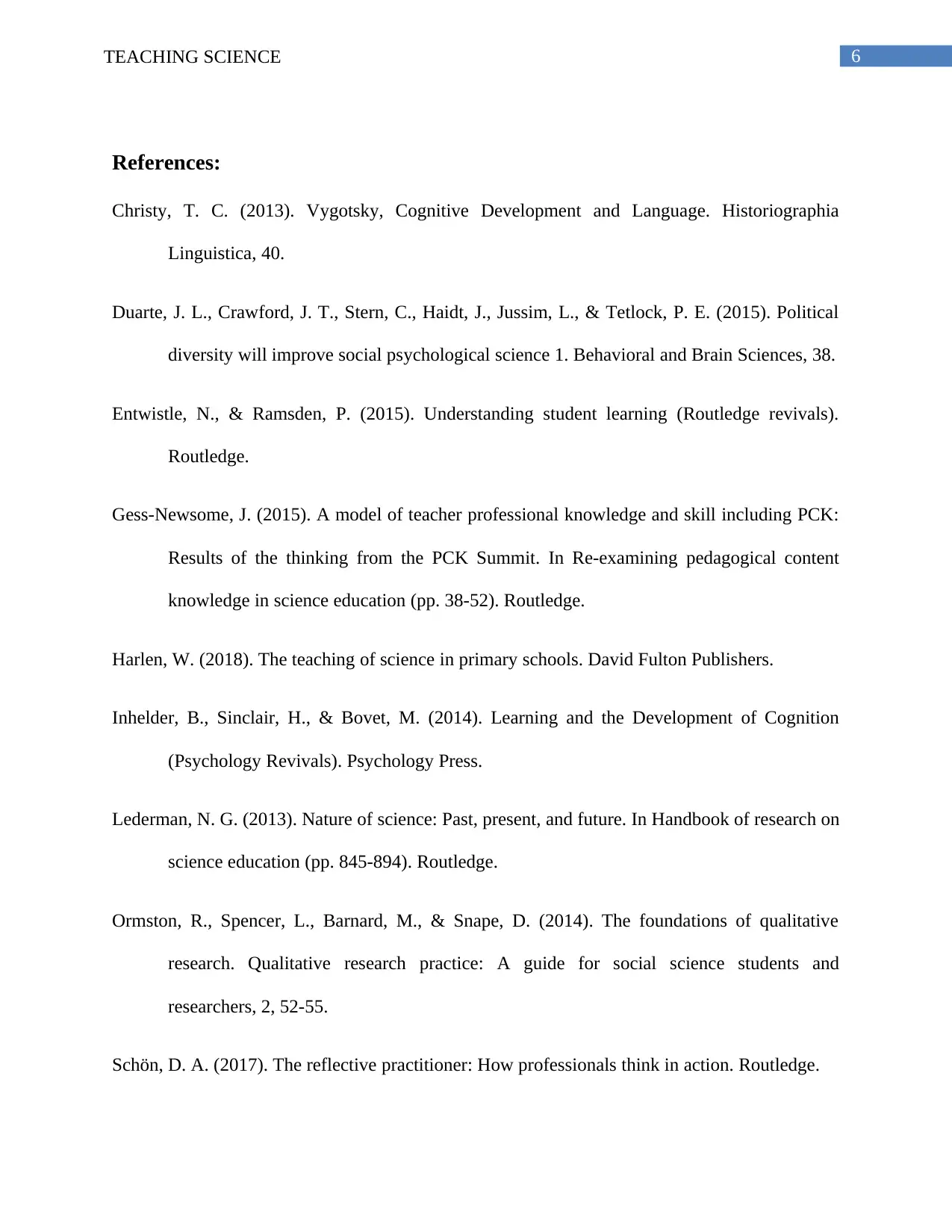
6TEACHING SCIENCE
References:
Christy, T. C. (2013). Vygotsky, Cognitive Development and Language. Historiographia
Linguistica, 40.
Duarte, J. L., Crawford, J. T., Stern, C., Haidt, J., Jussim, L., & Tetlock, P. E. (2015). Political
diversity will improve social psychological science 1. Behavioral and Brain Sciences, 38.
Entwistle, N., & Ramsden, P. (2015). Understanding student learning (Routledge revivals).
Routledge.
Gess-Newsome, J. (2015). A model of teacher professional knowledge and skill including PCK:
Results of the thinking from the PCK Summit. In Re-examining pedagogical content
knowledge in science education (pp. 38-52). Routledge.
Harlen, W. (2018). The teaching of science in primary schools. David Fulton Publishers.
Inhelder, B., Sinclair, H., & Bovet, M. (2014). Learning and the Development of Cognition
(Psychology Revivals). Psychology Press.
Lederman, N. G. (2013). Nature of science: Past, present, and future. In Handbook of research on
science education (pp. 845-894). Routledge.
Ormston, R., Spencer, L., Barnard, M., & Snape, D. (2014). The foundations of qualitative
research. Qualitative research practice: A guide for social science students and
researchers, 2, 52-55.
Schön, D. A. (2017). The reflective practitioner: How professionals think in action. Routledge.
References:
Christy, T. C. (2013). Vygotsky, Cognitive Development and Language. Historiographia
Linguistica, 40.
Duarte, J. L., Crawford, J. T., Stern, C., Haidt, J., Jussim, L., & Tetlock, P. E. (2015). Political
diversity will improve social psychological science 1. Behavioral and Brain Sciences, 38.
Entwistle, N., & Ramsden, P. (2015). Understanding student learning (Routledge revivals).
Routledge.
Gess-Newsome, J. (2015). A model of teacher professional knowledge and skill including PCK:
Results of the thinking from the PCK Summit. In Re-examining pedagogical content
knowledge in science education (pp. 38-52). Routledge.
Harlen, W. (2018). The teaching of science in primary schools. David Fulton Publishers.
Inhelder, B., Sinclair, H., & Bovet, M. (2014). Learning and the Development of Cognition
(Psychology Revivals). Psychology Press.
Lederman, N. G. (2013). Nature of science: Past, present, and future. In Handbook of research on
science education (pp. 845-894). Routledge.
Ormston, R., Spencer, L., Barnard, M., & Snape, D. (2014). The foundations of qualitative
research. Qualitative research practice: A guide for social science students and
researchers, 2, 52-55.
Schön, D. A. (2017). The reflective practitioner: How professionals think in action. Routledge.
Paraphrase This Document
Need a fresh take? Get an instant paraphrase of this document with our AI Paraphraser
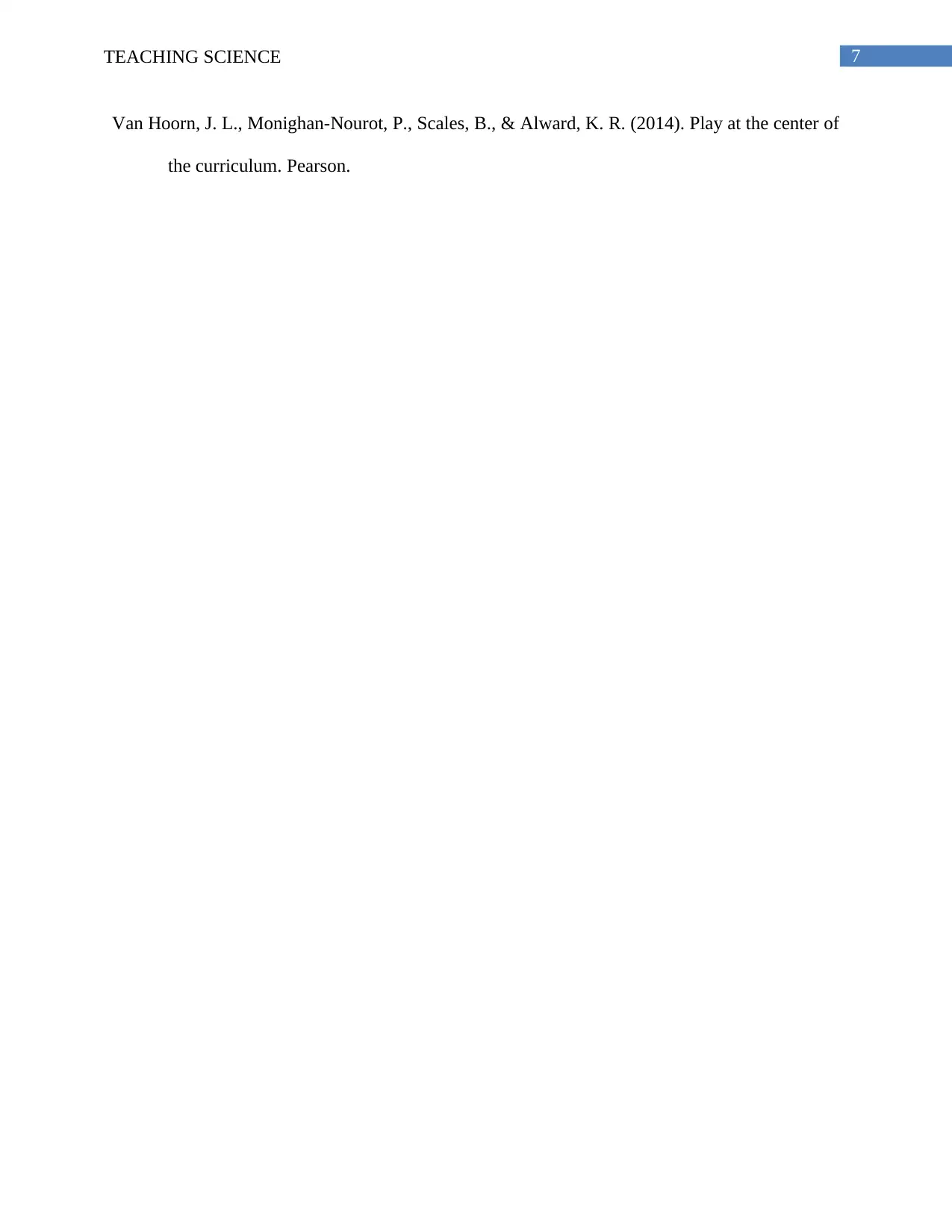
7TEACHING SCIENCE
Van Hoorn, J. L., Monighan-Nourot, P., Scales, B., & Alward, K. R. (2014). Play at the center of
the curriculum. Pearson.
Van Hoorn, J. L., Monighan-Nourot, P., Scales, B., & Alward, K. R. (2014). Play at the center of
the curriculum. Pearson.
1 out of 8
Related Documents
Your All-in-One AI-Powered Toolkit for Academic Success.
+13062052269
info@desklib.com
Available 24*7 on WhatsApp / Email
![[object Object]](/_next/static/media/star-bottom.7253800d.svg)
Unlock your academic potential
Copyright © 2020–2026 A2Z Services. All Rights Reserved. Developed and managed by ZUCOL.





